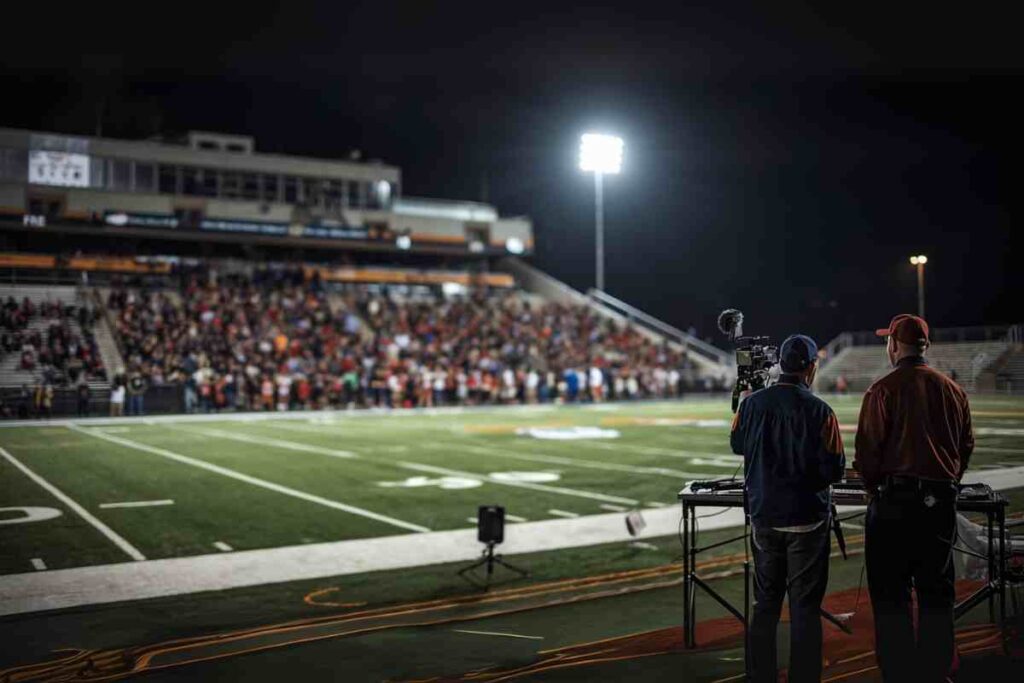The MSHSAA football broadcast apology has become a major talking point in Missouri high school sports. When a broadcast fails, it is more than just a technical issue. Families rely on these streams to watch their children compete, communities expect fair and professional coverage, and athletes deserve recognition for their hard work. We will look at what caused the apology, how it impacted different groups, the lessons that came from it, and what it means for the future of high school sports broadcasting.
Understanding MSHSAA and Its Role in High School Sports
The Missouri State High School Activities Association, known as MSHSAA, manages and oversees high school athletics and other student activities across the state. From football and basketball to music competitions, it ensures that students get fair opportunities to showcase their talents.
Broadcasting is now a major part of these events. In the past, parents and fans had to attend games in person, but live streaming has expanded access. This change has created both opportunities and responsibilities. When broadcasts succeed, they strengthen communities. When they fail, they can damage trust and credibility.
What Led to the MSHSAA Football Broadcast Apology
The broadcast that required an apology involved a mix of technical and commentary issues. Viewers reported problems with score updates, disruptions during live coverage, and remarks that some felt were unprofessional.
For many parents who could not attend the game in person, the broadcast was their only connection to the action. When problems arose, it became more than just a small mistake. It felt personal, because high school sports carry emotional weight for families, students, and local communities.
Why This Incident Gained Attention
High school football in Missouri is more than just a sport. It is part of the culture and a source of pride. Playoff games and championship broadcasts attract large audiences, and expectations are high.
The fallout from this incident grew quickly because of social media. Within hours, frustrated parents, students, and community members were sharing their reactions online. Local news outlets picked up the story, turning a broadcast issue into a statewide conversation about accountability and professionalism.
Community Reactions to the Apology
Parents and Families
Parents expressed disappointment, especially those relying on the stream to watch their children compete. Some voiced anger that technical and commentary errors distracted from what should have been a proud moment.
Student Athletes
For student athletes, recognition is a big part of motivation. Many felt that mistakes overshadowed their achievements. However, some appreciated the fact that MSHSAA publicly acknowledged the problem instead of ignoring it.
Media and Community Members
Local media amplified the incident, and online discussions ranged from humor to serious criticism. This reaction showed how quickly broadcast errors can damage trust and reputation.
Why an Apology Was Important
An apology in sports broadcasting is not only about admitting mistakes. It is about taking responsibility and showing that fans, athletes, and families matter.
When MSHSAA issued the football broadcast apology, it sent a clear message. The organization was willing to admit fault and commit to doing better. That step was necessary to rebuild credibility and reassure communities that future broadcasts would improve.
Lessons Learned from the MSHSAA Football Broadcast Apology
Mistakes are part of live events, but they also provide valuable lessons. Broadcasters and organizations can reduce the chances of repeat issues by focusing on a few important areas:
- Technology reliability: Backup systems and strong internet connections prevent disruptions.
- Commentator training: Broadcasters must respect athletes and maintain professionalism at all times.
- Transparency: Honest communication about mistakes builds trust.
- Focus on athletes: Every broadcast should highlight student athletes fairly and respectfully.
These lessons can apply not only to MSHSAA but to any organization covering sports.
Comparisons with Other Sports Broadcasting Issues
Broadcasting errors are not unique to MSHSAA. Professional leagues and college networks have also issued public apologies in the past. These often involve mispronounced names, offensive remarks, or major technical breakdowns.
What makes this case different is the direct impact on young athletes and their families. For many students, this was their first chance to appear on a larger stage. Mistakes in those moments carry greater weight.
How MSHSAA Plans to Improve Future Broadcasts
After the apology, MSHSAA announced steps to strengthen its approach to sports coverage. These include reviewing broadcast contracts, improving training for commentators, and upgrading equipment.
Community feedback is also part of the solution. By listening to parents, athletes, and schools, MSHSAA can rebuild trust and ensure that its broadcasts meet expectations.
The Bigger Picture Beyond Missouri
The incident has lessons that extend beyond Missouri. High school sports across the United States are increasingly broadcast online. This trend provides opportunities for exposure but also raises the stakes for accuracy and professionalism.
Other associations can learn from this case. By investing in technology, training, and transparency, they can avoid similar problems and protect the trust of their audiences.
Expert Insight on Sports Broadcasting Standards
According to data from Sports Video Group, streaming errors and poor commentary are among the top complaints from viewers of high school and college sports broadcasts. The most successful networks are those that combine reliable technology with trained announcers who respect both the athletes and the audience.
This aligns with what happened in Missouri. The MSHSAA football broadcast apology highlights how small errors can have big consequences if trust is broken.
FAQs
What was the MSHSAA football broadcast apology about?
It was a public statement issued after technical issues and unprofessional commentary disrupted a high school football game broadcast in Missouri.
Why was the apology important?
The apology was important because it restored credibility and showed that MSHSAA values student athletes, families, and communities.
Who was most affected by the broadcast problems?
Parents who could not attend games, student athletes seeking recognition, and community members following the matches were most affected.
What steps is MSHSAA taking to improve broadcasts?
MSHSAA is reviewing its broadcasting process, investing in better technology, and providing more training for announcers.
Does this have implications beyond Missouri?
Yes, because it highlights the growing importance of reliable and professional high school sports coverage across the United States.
Conclusion
The MSHSAA football broadcast apology was more than an admission of technical errors. It was a reminder that high school sports are about community, pride, and respect for student athletes. By addressing mistakes openly and committing to improvements, MSHSAA has the chance to rebuild trust and set higher standards for future broadcasts.
If you are a parent, student, or community member who relies on high school sports streams, stay engaged with MSHSAA updates and share feedback when issues arise. Your voice plays a role in making broadcasts better for everyone.





